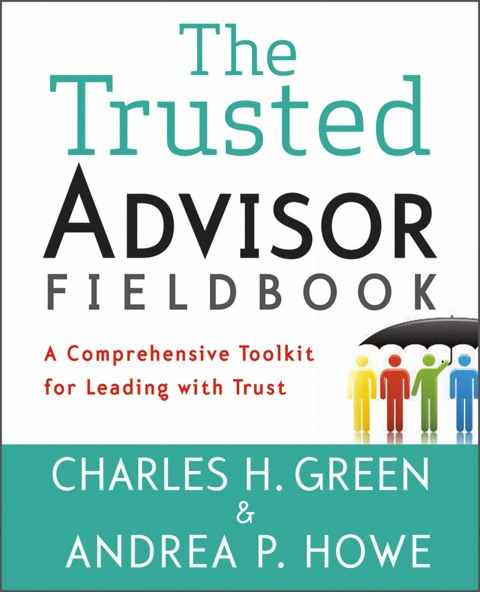 In celebration of the “The Trusted Advisor Fieldbook: A Comprehensive Toolkit for Leading with Trust” a new book written by myself and Andrea Howe in partnership with Wiley Books, we’ve been tweeting a series of Daily Trust Tips.
In celebration of the “The Trusted Advisor Fieldbook: A Comprehensive Toolkit for Leading with Trust” a new book written by myself and Andrea Howe in partnership with Wiley Books, we’ve been tweeting a series of Daily Trust Tips.
Andrea and I tweet one #TrustTip per business day, counting down until publication day, October 31. You can access these daily trust tips on Twitter, by using the hashtag (or pound sign) followed by TrustTip. Like this: #TrustTip. You can find us on Twitter at @AndreaPHowe and @CharlesHGreen.
The Tips
We try to stay away from platitudes. They’re meant to be precise and provocative, things you can apply today to enhance your trustworthiness and build stronger, more trusting relationships.
And if that still isn’t enough to motivate you to get on Twitter, we keep a running list of all the #TrustTips right here on our site.
The past two weeks of tips have sparked a good deal of talk on Twitter. Below is the recap of Tips #134-115. You can find the recap of #144-135 here.
Trust Tips Recap: #134– #115
#134: The purchasing agent is your new client. Treat them so. Their needs go beyond beating you up.
#133: If you feel odd about something: notice it. Say it out loud. Talk about it. Trust your gut.
#132: Don’t say what you’ll do, do it. Doing is the best talking. Sell by doing, not by talking.
#131: When you don’t know the answer: say, “I don’t know the answer.” What a concept.
#130: Don’t lie. Don’t fake it. Don’t justify it. Don’t leave things out. Don’t mislead. Don’t lie. Don’t.
#129: Easy way to increase reliability: say you’ll do something—then do it. On time.
#128: Under-promised and over-delivered means you’re lying. Better to do exactly what you said you’d do.
#127: Over a drink, ask your client what (s)he thinks their boss most wants from them.
#126: Dress code: one tiny notch higher than your client—no less, but no more either.
#125: Subscribe to your 2nd biggest customer’s 2nd most important industry trade publication.
#124: Adopt the safest cultural time standard: if you’re on-time, you’re late.
#123: Return calls unbelievably fast. You can wait to get the fix, but return the call unbelievably fast.
#122: Make lots of small promises & consistently follow through.
#121: Announce changes immediately & acknowledge the impact—especially when you won’t deliver as promised.
#120: Don’t just not lie; tell as much truth as possible, except where hurtful to others.
#119: Use pre-meetings; the final meeting should be ceremonial, no surprises.
#118: Identify some of your customers’ unique terminology; if it fits, use it yourself.
#117: Five credentials after your name on the business card is three too many.
#116: Give your meetings goals—not just agendas.
#115: In a meeting, notice who looks like they want to say something. Ask them to do so.
Here are a couple of my favorites:
# 129, Easy way to increase reliability: say you’ll do something—then do it. On time.
How many times have we been reliant on someone to get their job done in order for us to complete ours? It starts in middle school—from home-made science projects—and carries through to our professional lives. Efficient teamwork is part of every successful business. That teamwork extends outside of your office and into your client’s. Your client’s ability to rely on you to get the job done when you say you will makes for a smooth relationship, where no matter what, they feel they can trust you. Reliability is one of the four key factors in the Trust Equation, and one of the key factors we reference in any recommendation.
#116, Give your meetings goals—not just agendas.
Meetings seem to be a way of life when it comes to maintaining a steady business. It’s a practice that we all acknowledge for its necessity but in a way, seem to dread. Why is that? Many times meetings abide by a checklist of items to be discussed but after just thirty minutes minute details start taking over and the overall goals are lost. Creating goals as well as agendas for your meetings allows for the bigger picture to be maintained. It’s important to ensure everyone feels that they aren’t losing valuable time doing something else while they are listening to you veer off course.
#131, When you don’t know the answer: say, “I don’t know the answer.” What a concept.
It is amazing how simple this concept is–yet how few people subscribe to it. One of the quickest ways to reduce your customer’s trust in you is to answer their question incorrectly or to dodge it entirely. The reverse is ironically true as well: if you truthfully answer a question—especially if the answer is, “I don’t know”—they will trust you in that moment, and from then on as well.
Which ones did you find most meaningful?
We’ll be publishing more #TrustTip next week and every week to book publication. Share the wealth; tell others about #TrustTip—new tips posted every weekday at 8:30AM.


 Many people in this world work for tips alone. We think it’s about time that the tips start working for people.
Many people in this world work for tips alone. We think it’s about time that the tips start working for people. In celebration of the “The Trusted Advisor Fieldbook: A Comprehensive Toolkit for Leading with Trust” a new book written by myself and Andrea Howe in partnership with
In celebration of the “The Trusted Advisor Fieldbook: A Comprehensive Toolkit for Leading with Trust” a new book written by myself and Andrea Howe in partnership with